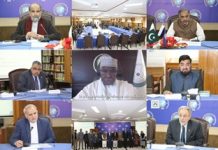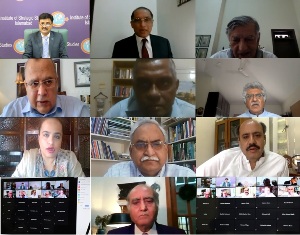Press Release
Webinar
India’s Aggressions Towards Its Neighbours: A Threat to Regional Stability
India Study Centre (ISC), at Institute of Strategic Studies Islamabad (ISSI), organized a Webinar titled,” India’s Aggressions towards its Neighbors: A Threat to Regional Stability” on June 12, 2020. The webinar brought together distinguished experts on the strategic culture of South Asia amid India’s aggressive postures towards neighbouring countries. The panellists included Ambassador Riaz Khokhar, Ambassador Salman Bashir, Dr. Moonis Ahmar, Ambassador Zamir Akram, Dr Asma Shakir Khawaja, Maj. Gen (R) Dr. Shahid Hashmat and Dr. Zafar Nawaz Jaspal.
In his introductory remarks, Dr. Saif Malik, Director India Study Centre at ISSI, highlighted that India has indulged itself in conflicts with all its neighbours. Its policies are manifested under the influence of Hindutva ideology. He raised some thought provoking questions to the panellists for seeking their input regarding how to make India realize that dialogue in the only key to resolve the disputes in the strategic architecture of South Asia.
Ambassador Riaz Khokhar, former Foreign Secretary, highlighted that India’s strategic concept of ‘Akhand Bharat’ is no more relevant. India’s steps in August, 2019 are its miscalculation that it will lead to the final solution of the Kashmir dispute. He mentioned that aggression as the part of Indian policies in the region has no more acceptance and Pakistan will have to deal with India very wisely by exposing its hegemonic policies to the world.
Ambassador Salman Bashir, former Foreign Secretary, was of the view that the world need to understand the symptoms of Indian behaviour through the lens of its political aims and military objectives. India is trying to change the status quo in the region. He also emphasized that Pakistan must deepen its consultations with China on the issues created by India in order to counter Indian hostile designs in the region.
Dr. Moonis Ahmar, Meritorious Professor from Karachi University, highlighted about the resentment present in the masses of Bangladesh on the recent controversial Citizen Amendment Act passed by India, which led to the insecurity among Bangladeshi people. He further pointed out that the elites in Bangladesh and likeminded people are pursuing Indian line but at popular level the situation is very different and people are well aware of Indian interference in domestic affairs of Bangladesh.
Ambassador Zamir Akram, former permanent representative of Pakistan in the United Nations dilated that India had captured area of 400 km from Nepal just to establish hegemony on its small neighbours. India also tried to influence the Foreign Policy of Nepal. These moves of India were neutralized by Chinese intervention, which helped Nepal in construction of 800 km long highway for better connectivity in the region. He further said Pakistan needs to re-evaluate its position on Nepal considering the current developments in the region. China, Pakistan and Nepal equation of cooperation will be helpful to improve the situation in the region.
Dr. Asma Shakir Khawaja, Associate Professor, National Defence University Islamabad, expressed that the behaviour of a state is defined by the identity, norms, rules and institutions of the state and India is following notion of Hindutva on stated fronts. Hindutva is a destabilizing factor for the region as the states in the region are under threat to exercise their sovereignty. India’s emerging posture is manifested in its expansion of borders at the expense of the territorial integrity of regional states. As a result, India is the least connected country in the region. She further emphasised that the Nuclear control in the Hindutva driven leadership of India is a big threat to regional peace and stability.
Major General (R) Dr. Shahid Hashmat, former High Commissioner of Pakistan to Sri Lanka, stressed on the fact that India is aggressive towards entire South Asian states since it considers itself as the sole hegemon. India has also undermined the prospects of peaceful resolution of any conflict and as a result has crippled SAARC. India tried to treat Sri Lanka as a colony and in 1987 it invaded Sri Lanka on the pretext of peace keeping and was not authorized by any international organisation. By mentioning all this, he tried to portray that India is trying to keep its knee on Sri Lanka’s neck.
Dr. Zafar Nawaz Jaspal, professor Quaid-e-Azam University, Islamabad, focused on the fact that ‘False Flag Operation’ is part of the Modi’s strategy and during the past six years there have been numerous occasions in which they have tried to apply it. Thus, it is a new normal in the Indian strategic culture. India has now also started to look at Indian Ocean as its own India’s ocean which will disturb the strategic balance in the region.
Ambassador Aizaz Ahmad Chaudhry, Director General ISSI in his keynote address made three important points:
- Modi has brought a paradigm shift to India internally and externally that has proved to be a disaster. Hindutva driven policies have eliminated space for minorities. India is no longer been visualised as a pluralistic and democratic state.
- India’s relations with all its neighbours are troublesome.
- Is India a victim or an aggressor? For the first time India is being exposed as an aggressor and it is evident that India is being exposed of its true colours.
Ambassador Khalid Mehmood, Chairman Board of Governors, ISSI, in his concluding remarks mentioned that India’s fundamental policy in South Asia is to preserve and strengthen its dominance in the region. He further said instead of getting support from neighbours, India is getting suspicion and enmity.












